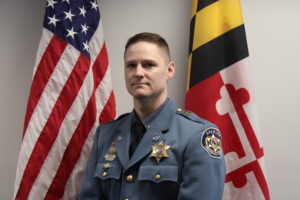Major Todd Kerns
Patrol Commander | Patrol Division

Major Todd Kerns is a 1987 Graduate of South Hagerstown High School and a 1989 Graduate of Hagerstown Community College with an AA Degree in Administration of Justice. Additionally, Captain Kerns is a 1992 Graduate of Shippensburg University with a BS Degree in Administration of Justice.
Kerns began his law enforcement career in January of 1994 when he was hired by the Washington County Sheriff’s Office. Kerns graduated from the Western Maryland Police Academy in May of 1994. He was the recipient of the Scholastic Achievement Award for the 28th Class of the Western Maryland Police Academy.
Kerns made his way through the ranks of the Patrol Division being promoted to Corporal in 1999 and later Sergeant in 2005. During his time in Patrol, Kerns served as a Field Training Officer and Assistant Shift Supervisor.
In 2007, Kerns transferred to the Washington County Narcotics Task Force acting as the Supervisor for the Sheriff’s Office. While at the Narcotics Task Force, Kerns served as the Director from November 2007 to January 2010 and again from January 2012 to January 2014. In 2012 Kerns was promoted to the rank of Lieutenant.
In June 2014 Kerns was promoted to the rank of Captain-Investigative Services. His responsibilities include oversight for the Criminal Investigative Unit, Narcotics Task Force Agents, Digital Investigations and Forensics Unit, and the Traffic Criminal Interdiction Unit. Kerns was promoted to the rank of Major in June of 2024.
Kerns is married to his wife Kathy and has two children, Matthew and Danielle.
Captain Joel Footen
Assistant Patrol Commander| Patrol Division

Captain Joel Footen has lived in Washington County for the majority of his life. He is a 2002 graduate of Washington County Technical High School, and currently has a Bachelor of Science Degree in Criminal Justice.
He began his law enforcement career in 2004 when he was hired as a civilian police communications operator. In 2006, he was hired as a patrol deputy and attended the Western Maryland Police Academy.
As a patrol deputy, Footen was recognized as Deputy of the Year for 2010 and received several awards for service, and unit citations for team accomplishments. He later served on the Traffic Criminal Interdiction Unit, until being promoted to Corporal in 2013. He was then promoted to Sergeant in 2014, and then to Lieutenant in 2015. As Lieutenant, Footen commanded a patrol squad until 2018 when he was transferred to the Criminal Investigation Unit as the unit supervisor.
Footen also is a member of the Washington County Special Response Team and has served on the team since 2008. He has served as a Team Leader and is currently the Assistant Team Commander. He is also a police instructor for general academics, firearms, and chemical/less-lethal munitions.
In March of 2023, Footen was promoted to the rank of Captain-Investigative Services. His responsibilities include overseeing the Criminal Investigation Unit, Narcotics Task Force Agents, Digital Investigations and Forensics Unit, and the Traffic Criminal Interdiction Unit.
Footen and his wife, Kelly, have two daughters: Clara and Caroline.
Narcotics Task Force
Founded in 1986, The Washington County Narcotics Task Force is comprised of members from the Hagerstown Department of Police and the Washington County Sheriff’s Office. The NTF is responsible for the investigation, arrest, and prosecution of persons who violate the controlled dangerous substance laws of Maryland, regardless of the sophistication of the illicit operation. The office is currently staffed by fifteen personnel including five officers from the City Police, five from the Sheriff’s Department, an Intel Analyst, one full-time prosecutor from the State’s Attorney’s Office, one part-time prosecutor/nuisance abatement attorney, and two support staff.
The NTF is housed with the Drug Enforcement Administration and the Maryland State Police at the DEA’s Hagerstown Office and works closely with Hagerstown’s Street Crime Unit. This pooling of investigative resources benefits each investigative unit with increased manpower, less duplication of effort, and coordination of the targeting of drug offenders. Some of the NTF agents are also federally deputized members of the DEA, which gives these local agents enforcement powers anywhere in the United States. This has been very beneficial since drug violators frequently move through the tri-state area.